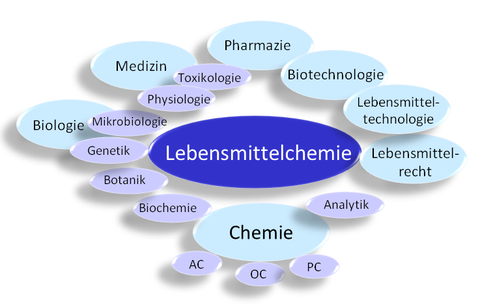What is food chemistry
In response to the question as to what is special about food chemistry, one usually hears that food chemists are "first and foremost analysts" and thus above all "experts in consumer health protection". Historically, this can also be well justified. (see Aktuelle Wochenschau (in German)). From a scientific point of view, however, food chemistry is much more. Everything is chemistry - and in a figurative sense everything that has to do with food and nutrition is food chemistry. Chemistry is the basis of all "molecular" sciences. Food chemistry is thus the indispensable prerequisite for new findings in all food and nutrition sciences, nutritional medicine, toxicology, food technology and food hygiene.
Consumer protection in connection with the handling of foodstuffs, cosmetic products and consumer goods naturally remains a central task of the profession. Increasingly important, however, alongside food testing and control, are questions about the effects and evaluation of food ingredients against the background of the future topic of "nutrition and health". Food chemists are sought-after specialists in commercial laboratories, both for approval questions and for legal assessment. They work in quality assurance and product development in the food and cosmetics industry, biotechnology and related sectors. The interdisciplinary appeal of the subject lies in the combination of the various fields of chemistry, above all organic, biological and analytical chemistry, with related natural and engineering science subjects such as microbiology, food and biotechnology, toxicology and nutrition science. In addition, there is a close connection to special fields of law such as food law.
Anyone who deals with food chemistry works in an interdisciplinary manner in every respect. And food chemists are thus much more than "pure analysts" - they are more generalists than specialists, and thus experts in all questions relating to food and nutrition.

